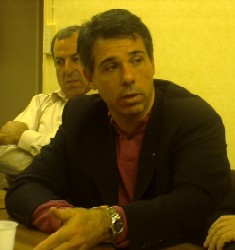
On the issue of insecurity in France, politicians, editorialists, and educators all express their opinions. Everyone offers their solutions. It is also logical to know the position of those most directly concerned: the police. Jean-Claude Delage is a perfect spokesperson for them. He is the secretary general of the majority union of peacekeepers, which is very representative, as the voter turnout in the elections exceeds 70% and all police officers vote.
“We are tired of being the only ones managing problems. We should not be doing the work of teachers, doctors, or social workers. For us, it is urgent to organize a Security Grenelle,” demands Jean-Claude Delage. This imperative will be part of the motion submitted to all the prefectures on November 13. The two other important themes are “recognition of police work everywhere, with a decrease in crime, and for the justice system to follow up on police work. This is a priority because it is common sense with the necessity of a minimum sentence. I also hope that on Monday, the prefect of Alpes-Maritimes will receive the Alliance union at least to open the door,” adds the secretary general. He refuses to join the political game, although he admits “feeling better supported by Nicolas Sarkozy” and notes that the rival union UNSA called to vote for Ségolène Royal. “When Nicolas Sarkozy criticizes ideological magistrates who don’t imprison a young person we have arrested 70 times, we agree. But that’s not playing politics,” he justifies.
“It is out of the question to withdraw and give ground to thugs and let them settle”
Local policing is about “putting officers in the field but without the possibility of taking action, arresting, or investigating. We must place officers in the neighborhoods, but not just for show. If today we are attacked, it is because we are present. Preventive policing is a utopia, and community policing is not the debate.” To him, the workforce is very poorly utilized, especially “for missions that have nothing to do with police duties and that occupy thousands of police officers every day.”
He immediately dismisses the emerging controversy that police officers have been instructed to intervene less in certain neighborhoods: “We’ve just seen it in Nice where the police quickly intervened to stop clashes between two communities. It is out of the question to withdraw and give ground to thugs and let them settle. I advocate the duty to stay in all neighborhoods so that honest people can live.” He calls for recognition of the profession’s danger with better pay.
Locally, it was an opportunity to assess the situation. The priority lies in the west of the department, with a significant staffing problem in Cannes: -25% over 20 years, even though Cannes receives the same number of complaints as a city of 300,000 inhabitants. The municipal police are more numerous, which for the Alliance union causes absurd situations “wherein the national police come to assist the municipal police.” Nice also faces similar problems, especially in the summer: “Nice is not classified as a seaside resort. Thus, we do not receive reinforcements during the summer season.” The final request: to classify the Alpes-Maritimes as zone 1, like the departments of the Île-de-France, whereas the 06 is currently in the same zone as Creuse…
All these demands will reach the desks of all the prefects in mainland France. The police will have clearly expressed their working conditions and current difficulties in ensuring the protection of property and people.


